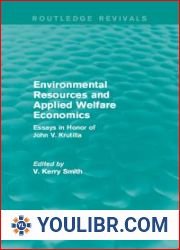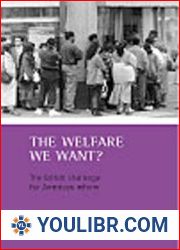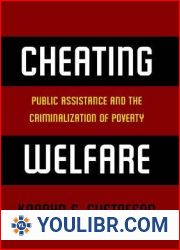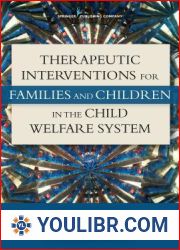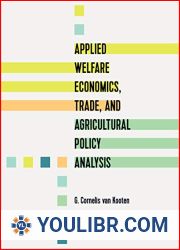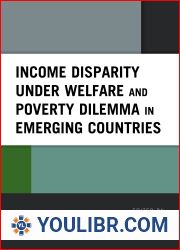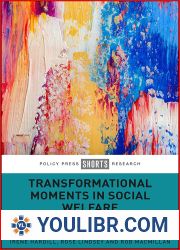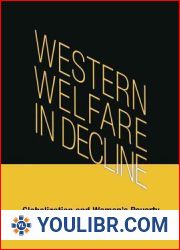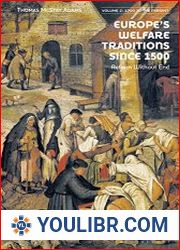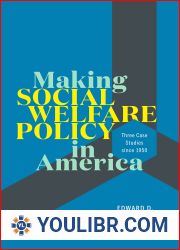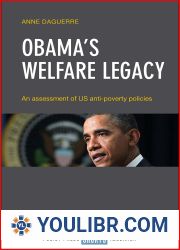
BOOKS - Democracy and the Welfare State: The Two Wests in the Age of Austerity

Democracy and the Welfare State: The Two Wests in the Age of Austerity
Author: Alice Kessler-Harris
Year: October 31, 2017
Format: PDF
File size: PDF 2.2 MB
Language: English

Year: October 31, 2017
Format: PDF
File size: PDF 2.2 MB
Language: English

The Plot of 'Democracy and the Welfare State: The Two Wests in the Age of Austerity' In the aftermath of World War II, states on both sides of the Atlantic enacted comprehensive social benefits to protect working people and constrain capitalism. This widely shared consensus specifically linked social welfare to democratic citizenship, upholding greater equality as the glue that held nations together. However, in the new age of global inequality, welfare-state retrenchment, and economic austerity, the relationship between capitalism and democracy is being put to the test. In "Democracy and the Welfare State: The Two Wests in the Age of Austerity leading historians and social scientists rethink the history of social democracy and the welfare state in the United States and Europe, exploring how changes in the distribution of wealth are reshaping the meaning of citizenship in a post-welfare state era. The book begins by examining the fortunes of the welfare state, discussing distinct national and international settings and speaking to both local particularities and transnational and transatlantic exchanges. Contributors explore the lives of migrant workers, gender, and the family in the design of welfare policies, as well as the fate of the European Union and the prospects of social movements.
The Plot of «Democracy and the Welfare State: The Two Wests in the Age of Austerity» После Второй мировой войны государства по обе стороны Атлантики приняли комплексные социальные льготы для защиты трудящихся и ограничения капитализма. Этот широко распространенный консенсус конкретно связывал социальное обеспечение с демократическим гражданством, отстаивая большее равенство как клей, который скреплял нации. Однако в новый век глобального неравенства, сокращения государственного благосостояния и экономической экономии отношения между капитализмом и демократией подвергаются испытанию. В книге «Демократия и государство всеобщего благосостояния: два желания в эпоху жесткой экономии» ведущие историки и социологи переосмысливают историю социальной демократии и государства всеобщего благосостояния в США и Европе, исследуя, как изменения в распределении богатства меняют смысл гражданства в эпоху государства после всеобщего благосостояния. Книга начинается с изучения состояния государства всеобщего благосостояния, обсуждения различных национальных и международных условий и обсуждения как местных особенностей, так и транснациональных и трансатлантических обменов. Участники изучают жизнь трудящихся-мигрантов, пол и семью при разработке политики социального обеспечения, а также судьбу Европейского союза и перспективы социальных движений.
The Plot of « Democracy and the Welfare State : The Two Wests in the Age of Austerity » Après la Seconde Guerre mondiale, les États des deux côtés de l'Atlantique ont adopté des avantages sociaux intégrés pour protéger les travailleurs et limiter le capitalisme. Ce consensus généralisé liait spécifiquement la sécurité sociale à la citoyenneté démocratique, défendant une plus grande égalité comme la colle qui scellait les nations. Cependant, à l'ère nouvelle des inégalités mondiales, de la réduction des richesses publiques et de l'austérité économique, les relations entre capitalisme et démocratie sont mises à l'épreuve. Dans le livre « Démocratie et État providence : deux désirs à l'ère de l'austérité », les historiens et sociologues de premier plan repensent l'histoire de la démocratie sociale et de l'État providence aux États-Unis et en Europe, examinant comment les changements dans la répartition des richesses changent le sens de la citoyenneté à l'ère de l'État après l'État providence. livre commence par une étude de l'état de l'État providence, un débat sur les différentes conditions nationales et internationales et un débat à la fois sur les caractéristiques locales et les échanges transnationaux et transatlantiques. s participants examinent la vie des travailleurs migrants, le sexe et la famille dans l'élaboration des politiques de sécurité sociale, ainsi que le sort de l'Union européenne et les perspectives des mouvements sociaux.
The Plot of «Democracy and the Welfare State: The Two Wests in the Age of Austerity» Después de la Segunda Guerra Mundial, los estados de ambos lados del Atlántico adoptaron beneficios sociales integrales para proteger a los trabajadores y limitar el capitalismo. Este consenso generalizado vinculaba específicamente el bienestar social con la ciudadanía democrática, defendiendo una mayor igualdad como pegamento que sellaba a las naciones. n embargo, en una nueva era de desigualdad global, reducción del bienestar público y austeridad económica, las relaciones entre el capitalismo y la democracia están siendo puestas a prueba. En el libro «La democracia y el estado del bienestar: dos deseos en la era de la austeridad», los principales historiadores y sociólogos reinterpretan la historia de la democracia social y el estado del bienestar en Estados Unidos y , investigando cómo los cambios en la distribución de la riqueza cambian el sentido de la ciudadanía en la era del estado después del bienestar general. libro comienza con un estudio de la situación del Estado del Bienestar, una discusión de las diferentes condiciones nacionales e internacionales y una discusión tanto de las características locales como de los intercambios transnacionales y transatlánticos. participantes examinan la vida de los trabajadores migrantes, el género y la familia en la formulación de políticas de bienestar social, así como el destino de la Unión Europea y las perspectivas de los movimientos sociales.
The Plot of «Democracy and the Welfare State: The Two Wests in the Age of Austerity» Depois da Segunda Guerra Mundial, os Estados de ambos os lados do Atlântico adotaram benefícios sociais integrados para proteger os trabalhadores e limitar o capitalismo. Esse consenso generalizado ligava especificamente a segurança social à cidadania democrática, defendendo uma maior igualdade como cola que unia as nações. No entanto, em um novo século de desigualdade global, redução do bem-estar do Estado e economia, as relações entre capitalismo e democracia estão sujeitas a testes. No livro «Democracia e Estado de bem-estar: dois desejos na era da austeridade», os principais historiadores e sociólogos redefinem a história da democracia social e do Estado de bem-estar nos Estados Unidos e na , explorando como as mudanças na distribuição da riqueza mudam o sentido da cidadania na era do Estado após o bem-estar. O livro começa com o estudo da condição do Estado de bem-estar, o debate sobre as diferentes condições nacionais e internacionais e o debate sobre as características locais e as trocas transnacionais e transatlânticas. Os participantes estudam a vida dos trabalhadores migrantes, o sexo e a família na formulação de políticas de segurança social, assim como o destino da União Europeia e as perspectivas dos movimentos sociais.
The Plot of «Democracy and the Welfare State: The Two Wests in the Age of Austerity» Dopo la seconda guerra mondiale, gli Stati di entrambi i lati dell'Atlantico hanno adottato benefici sociali completi per proteggere i lavoratori e limitare il capitalismo. Questo consenso diffuso collegava concretamente la sicurezza sociale alla cittadinanza democratica, sostenendo una maggiore uguaglianza come colla che agganciava le nazioni. Tuttavia, in un nuovo secolo di disuguaglianze globali, di riduzione del benessere pubblico e di austerità economica, i rapporti tra capitalismo e democrazia sono messi a dura prova. Nel libro «Democrazia e Stato di benessere: due desideri di austerità», i principali storici e sociologi stanno ripensando alla storia della democrazia sociale e dello stato di benessere negli Stati Uniti e in , esplorando come i cambiamenti nella distribuzione della ricchezza stiano cambiando il senso della cittadinanza nell'era dello stato dopo il benessere generale. Il libro inizia studiando lo stato dello stato di benessere generale, discutendo le diverse condizioni nazionali e internazionali e discutendo sia le caratteristiche locali che gli scambi transnazionali e transatlantici. I partecipanti studiano la vita dei lavoratori migranti, il sesso e la famiglia nello sviluppo di politiche di sicurezza sociale, nonché il destino dell'Unione europea e le prospettive dei movimenti sociali.
The Plot of „Democracy and the Welfare State: The Two Wests in the Age of Austerity“ Nach dem Zweiten Weltkrieg verabschiedeten die Staaten auf beiden Seiten des Atlantiks umfassende Sozialleistungen zum Schutz der Arbeiter und zur Begrenzung des Kapitalismus. Dieser weitverbreitete Konsens verknüpfte speziell die soziale cherheit mit der demokratischen Staatsbürgerschaft und verteidigte mehr Gleichheit als den Klebstoff, der die Nationen zusammenhielt. In einem neuen Zeitalter globaler Ungleichheit, schwindender staatlicher Wohlfahrt und ökonomischer Ökonomie wird jedoch das Verhältnis zwischen Kapitalismus und Demokratie auf die Probe gestellt. In Democracy and Welfare State: Two Desires in a Age of Austerity interpretieren führende Historiker und Soziologen die Geschichte der sozialen Demokratie und des Wohlfahrtsstaates in den USA und neu und untersuchen, wie Veränderungen in der Vermögensverteilung die Bedeutung der Staatsbürgerschaft in der Post-Welfare-Ära verändern. Das Buch beginnt mit einer Untersuchung des Zustands des Wohlfahrtsstaates, einer Diskussion der verschiedenen nationalen und internationalen Bedingungen und einer Diskussion sowohl der lokalen Besonderheiten als auch des transnationalen und transatlantischen Austauschs. Die Teilnehmer untersuchen das ben von Wanderarbeitnehmern, Geschlecht und Familie bei der Gestaltung der Sozialpolitik sowie das Schicksal der Europäischen Union und die Perspektiven sozialer Bewegungen.
Spisek „Demokracja i państwo opiekuńcze: Dwa skrzydła w dobie oszczędności” Po II wojnie światowej, stwierdza, że po obu stronach Atlantyku przyjęto kompleksowe świadczenia socjalne w celu ochrony pracowników i ograniczenia kapitalizmu. Ten powszechny konsensus wyraźnie wiązał zabezpieczenie społeczne z demokratycznym obywatelstwem, opowiadając się za większą równością jako klejem, który trzymał narody razem. Jednak w nowej erze globalnych nierówności, kurczących się suwerennych bogactw i oszczędności ekonomicznych testuje się relacje między kapitalizmem a demokracją. W demokracji i państwie opiekuńczym: dwa pragnienia w epoce oszczędności, czołowi historycy i socjolodzy ponownie wyobrażają sobie historię socjaldemokracji i państwa opiekuńczego w USA i Europie, badając, jak zmiany w dystrybucji bogactwa zmieniają znaczenie obywatelstwa w erze postprocesowej państwa. Książka rozpoczyna się od zbadania stanu państwa opiekuńczego, omówienia różnych uwarunkowań krajowych i międzynarodowych oraz omówienia zarówno lokalnych osobliwości, jak i transnarodowych i transatlantyckich wymian. Uczestnicy badają życie pracowników migrujących, płeć i rodziny w rozwoju polityki zabezpieczenia społecznego, a także losy Unii Europejskiej i perspektywy ruchów społecznych.
''
"Demokrasi ve Refah Devleti: Kemer Sıkma Çağında İki Batı" Konusu İkinci Dünya Savaşı'ndan sonra, Atlantik'in her iki yakasındaki devletler, işçileri korumak ve kapitalizmi sınırlamak için kapsamlı sosyal faydaları benimsediler. Bu yaygın konsensüs özellikle Sosyal Güvenlik'i demokratik vatandaşlığa bağladı ve ulusları bir arada tutan yapıştırıcı olarak daha fazla eşitliği savundu. Bununla birlikte, yeni bir küresel eşitsizlik, azalan egemen zenginlik ve ekonomik kemer sıkma çağında, kapitalizm ile demokrasi arasındaki ilişki test edilmektedir. In Demokrasi ve Refah Devleti: Kemer Sıkma Çağında İki ArzuÖnde gelen tarihçiler ve sosyologlar, ABD ve Avrupa'daki sosyal demokrasi ve refah devletinin tarihini yeniden hayal ederek, servetin dağılımındaki değişikliklerin devletin refah sonrası döneminde vatandaşlığın anlamını nasıl değiştirdiğini inceliyorlar. Kitap, refah devletinin durumunu inceleyerek, çeşitli ulusal ve uluslararası koşulları tartışarak ve hem yerel özellikleri hem de ulusötesi ve transatlantik değişimleri tartışarak başlıyor. Katılımcılar, göçmen işçilerin yaşamlarını, sosyal güvenlik politikalarının geliştirilmesinde cinsiyet ve ailenin yanı sıra Avrupa Birliği'nin kaderini ve sosyal hareketlerin beklentilerini inceler.
The Plot of «Democracy and the Welfare State: The Wests in the Age of Astrity» بعد الحرب العالمية الثانية، اعتمدت الدول الواقعة على جانبي المحيط الأطلسي مزايا اجتماعية شاملة لحماية العمال والحد من الرأسمالية. ربط هذا الإجماع الواسع النطاق الضمان الاجتماعي على وجه التحديد بالمواطنة الديمقراطية، داعيًا إلى مزيد من المساواة باعتبارها الغراء الذي جمع الدول معًا. ومع ذلك، في عصر جديد من عدم المساواة العالمية، وتقلص الثروة السيادية، والتقشف الاقتصادي، يتم اختبار العلاقة بين الرأسمالية والديمقراطية. في الديمقراطية ودولة الرفاهية: رغبتان في عصر التقشف، يعيد المؤرخون وعلماء الاجتماع البارزون تصور تاريخ الديمقراطية الاجتماعية ودولة الرفاهية في الولايات المتحدة وأوروبا، ويفحصون كيف تغير التغييرات في توزيع الثروة معنى المواطنة في عصر ما بعد الرفاهية للدولة. يبدأ الكتاب بدراسة حالة دولة الرفاهية، ومناقشة مختلف الظروف الوطنية والدولية، ومناقشة الخصوصيات المحلية والتبادلات عبر الوطنية وعبر الأطلسي. ويدرس المشاركون حياة العمال المهاجرين ونوع الجنس والأسرة في وضع سياسات الضمان الاجتماعي، فضلا عن مصير الاتحاد الأوروبي وآفاق الحركات الاجتماعية.







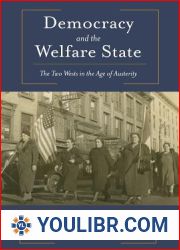
 49
49  2 TON
2 TON



